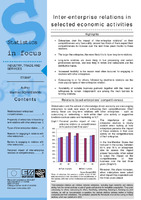Statistics in Focus. Inter-enterprise relations in selected economic activities.
| dc.contributor.author | EU Commission |
| dc.date.accessioned | 2020-11-23T16:04:32Z |
| dc.date.available | 2020-11-23T16:04:32Z |
| dc.date.issued | 2007-04-25 |
| dc.identifier.issn | 19770316 |
| dc.identifier.uri | https://ketlib.lib.unipi.gr/xmlui/handle/ket/3255 |
| dc.description | http://aei.pitt.edu/id/eprint/87421 |
| dc.description.abstract | Enterprises view the impact of inter-enterprise relations* on their competitiveness very favourably: around two thirds of them expect their competitiveness to increase over the next three years thanks to these relations. ‚ The larger the enterprise, the more likely it is to have long-term relations. ‚ Long-term relations are more likely in fuel processing and certain professional services, and less likely in hotels and restaurants and the distributive trades. ‚ ‘Increased flexibility’ is the reason most often favoured for engaging in relations with other enterprises. ‚ Outsourcing to or for others, followed by short-term relations are the most popular types of inter-enterprise relation. |
| dc.format.extent | 8p. |
| dc.language.iso | en |
| dc.publisher | Eurostat |
| dc.subject | Statistics |
| dc.subject | Enterprises |
| dc.title | Statistics in Focus. Inter-enterprise relations in selected economic activities. |
| dc.type | Working Document |
| dc.publisher.place | Luxembourg |

